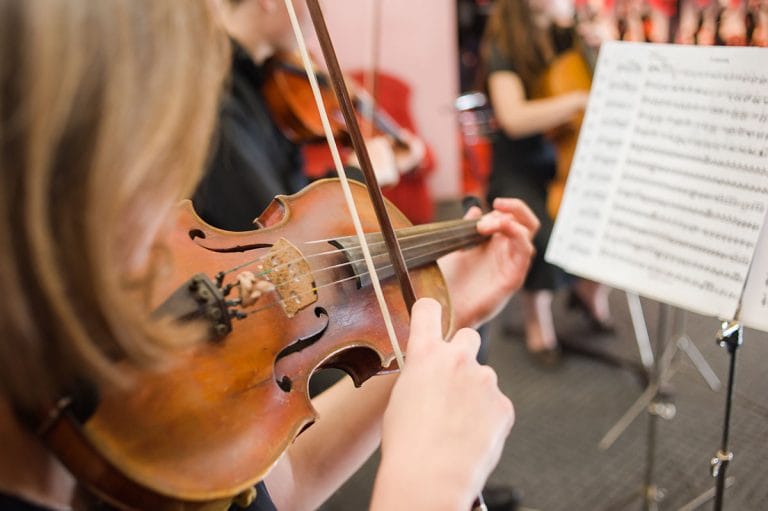When you look at famous artists and musicians like Yo-Yo Ma, Lizzo, Miri Ben-Ari, or others perform, you probably think, “Wow! They’re really good at what they do.”
But how did they get so good?
Except for those self-taught, the thanks usually go to the music teachers who pushed them to these creative feats. Among the ranks of classically-trained musicians-turned-legendary are people like Elton John, Lady Gaga, Lang Lang, Charlie Puth, and Brian May and Freddie Mercury of Queen, just to name a few.
Behind all the big names trained in classical music and theory are music teachers. Most music teachers generally either work as private teachers with their own studio or offer classes through a local school, community college, or university, and music teacher salaries can vary widely.
Music Teacher Salaries By the Numbers
Teaching music is a worthwhile calling and can be done on a full- or part-time basis. But how much you can charge and how much you can make as a music teacher depends on a lot of factors, from where you live to your qualifications and reputation or the type of instrument you teach.
What Is the Average Salary of a Music Teacher?
A music teacher’s average salary in the United States is $72,258. It can vary widely by state and city, as well as your qualifications, resume, reputation, area of expertise, and more.
Music Teachers Make the Most in These 10 States
A music educator’s salary varies by state and school. ZipRecruiter says Florida has the lowest music teacher salary at $37,714, and Oregon has the highest with $62,895.
- Oregon: $62,895
- Alaska: $62,586
- North Dakota: $62,576
- Massachusetts: $61,828
- Hawaii: $61,254
- Washington: $59,847
- Nevada: $59,175
- South Dakota: $59,141
- Colorado: $58,399
- Rhode Island: $58,225
Top 10 Highest Paying Cities for Music Teacher Jobs
No surprise here: If you live in a larger city with a higher than average cost of living, your salary as a music teacher is likely to be higher, too. According to Indeed, these are the cities where music teachers can earn the most:
- New York, NY: $33.76 per hour
- Frederick, MD: $32.54 per hour
- Irvine, CA: $31.58 per hour
- Chicago, IL: $29,56 per hour
- Orlando, FL: $29.15 per hour
- Fort Myers, FL: $24.92 per hour
- Houston, TX: $24.86 per hour
- San Antonio, TX: $24.47 per hour
- Tampa, FL: $23.70 per hour

10 States Where Music Teachers Earn the Least
Keep in mind that a lower salary might still go farther depending on where you live. Zippia’s list of the 10 lowest-salaried states for music teachers typically have lower costs of living as well:
- Missouri: $40,344
- Maine: $41,988
- South Carolina: $38,796
- Mississippi: $40,711
- Louisiana: $40,565
- South Dakota: $40,012
- Idaho: $38,855
- Arkansas: $37,892
- Arizona: $36,636
- Utah: $38,121

Are There Regional Differences in Music Teacher Salaries?
Yes. In most cases, regional differences in music teacher salaries align with the regional cost of living. Those offering music lessons in large urban areas are likely to be able to charge more for lessons, whereas those living in more rural areas or states that have a lower-than-average cost of living have less earning potential.
Not sure how to price your services? Check out our blog that explains how much to charge for music lessons.
Private vs Public Music Teachers: Who Makes More?
Private music educators make less on average ($54,498, per ZipRecruiter) than the average for all music teachers ($72,258) in the U.S. This could be due to a variety of factors, from having to match the rates of competitors to simply enjoying the flexibility of being able to work part-time.
Top 10 Cities Where Private Music Teachers Earn the Most
Private music instructors earn anywhere from $20,000 on the low end to $77,000 at the upper echelon. Per ZipRecruiter, 10 cities with higher-than-average salaries for private music teachers are:
- San Buenaventura, CA: $67,964
- Maricopa, CA: $67,745
- Soda Bay, CA: $66,718
- Tildenville, FL: $66,472
- Berry Creek, CA: $66,094
- Berkeley, CA: $65,978
- Spring, TX: $64,606
- Claude, TX: $63,577
- New York City, NY: $63,442
- Saint Paul, MN: $63,299

Do Music Teachers Earn More in Public or Private Schools?
Those teaching music in public schools make more than $11,000+ on average than those teaching in private schools. Glassdoor lists the median pay for a public school music teacher as $66,206 in 2024 vs $54,498 for the average private school music teacher pay in 2024 on ZipRecruiter.
Factors Influencing Music Teachers' Salaries
When you look at a salary that can range from $20,000 to upwards of $85,000, it’s clear there must be several different factors at play influencing how you can expect to earn. Here are some of the top considerations that can impact your take-home pay:
- Local cost of living
- Competitors’ rates
- Supply vs demand for services regionally
- Scarcity (i.e., teaching an instrument that few others teach)
- Education and years of training
- Reputation (could be both as a musician and as a teacher)
- Overhead and operational costs, such as the cost of music, instruments, repairs and maintenance, and so on
- Number of hours worked
- Workplace (e.g., private studio, online, school or university, etc.)
10 Ideas for Music Teachers Looking for Extra Income
Giving private lessons or getting a job giving music lessons at an educational institution isn’t the only way for you to make money with your musical prowess. If you’re looking for ways to boost your salary or earn more through a side hustle, here are some ideas:
- Offer monthly group theory lessons as an add-on to individual lessons
- Host group lessons with children, teens, or adults
- Expand your service area by offering virtual lessons
- Hold music theory and music appreciation workshops
- Dabble in performance consulting for other music teachers or musicians
- Write a music column for a local newspaper or magazine
- Start an online music blog or podcast
- Show off your own skills as a performing singer or musician at weddings, bars, events, and so on
- If you’re a private teacher, look for part-time contract teaching opportunities at local private or public schools
- If you’re a public music teacher, get an advanced degree or certification that can increase your base contract
What Music Teachers Do & Where They Work

Music teachers instruct students on how to sing or play musical instruments, usually in individual lessons, but sometimes in group settings. Some of the most common types of instruction and activities music teachers facilitate are:
- Warm-up techniques and exercises
- How to properly hold/play an instrument (e.g., hand position)
- Rhythm, melody, scales, pitch, and tempo
- Music sight-reading and memorization
- Assigning, evaluating, and grading lessons
- Performance tips and techniques
- Recitals
- Competition preparation
- Music theory and appreciation
- Field trips to museums, classical music concerts — and more
Instruction can be held in schools, at community and recreational centers, at places of worship, online, or via private lessons taught from home or a rented studio space.
The Pros and Cons of Being a Music Teacher
Music education, like any other profession, has both pros and cons. Some are common to any type of teaching, while others are more specific to teaching music as a career:
Pros of Being a Music Teacher
- Flexibility: Enjoy a part-time flexible schedule or opt for full-time work.
- Options: Operate your own studio and business or work through a school, university, or other organization.
- Fulfilling: Watch your students grow as musicians and watch as those who started with you as kids mature into accomplished young adults.
- Work anywhere: Teach students in any location with stable internet without leaving your music room.
- Passion as a profession: Not everyone can say they love their job. If you love music, teaching is a great way to turn your passion into profit.
Cons of a Career Teaching Music
- Challenging students: Students run the gamut from motivated and focused to disinterested and disruptive — consider having students (and parents) sign a contract or code of conduct agreement that explains what’s expected.
- Work-life balance: Having a home-based studio or the need to teach a lot of hours to make an adequate salary could lead to burnout.
- Business ownership: Operating a private studio comes with all the challenges that other small business owners face, from registering and paying taxes to budgeting, advertising, marketing, and operational costs for music, instruments, supplies, and more.
- Employer requirements: Some schools may require you to follow a specified lesson plan and agenda, which may differ from your teaching plans and style. Teaching in a school also usually comes with requirements for continuing education, licensing, and more.
- Income lulls: Your salary could fluctuate due to students’ summer or school vacations, the local economy, an influx of competitors, and so on.

Protect Your Music Teacher Career With Insurance Canopy
No matter where you decide to teach, protect your business with music teacher insurance from Insurance Canopy. Your policy comes with general and professional liability coverage to protect you from third-party medical injury, property damage, and other costly claims starting from $21.08 a month or $229 a year.
For less than the cost of a Beethoven’s Piano Sonatas music book, get teacher insurance online in 10 minutes or less and teach the musicians and singers of tomorrow with peace of mind!
FAQs About How Much Music Teachers Make
What Qualifications are Needed to Become a Music Teacher?
A love of music and the ability to play or sing may be the only qualifications you need to work as a private music teacher. However, to teach in schools, universities, or other organizations you’re likely to need an undergraduate or higher degree in music education or performance, and may even need a teaching certificate.
How Much Do Private Music Teachers Make?
Private music teachers make $54,498 on average, with salaries ranging from $20,000 to $84,000 a year. Key factors influencing how much private music teachers make include location, specialty, experience, education, and reputation or fame.
How Does Experience Affect a Music Teacher's Salary?
Teaching experience contributes to tenure (for those teaching in schools) and reputation (for those with private studios), both of which can impact a music teacher’s salary and ability to attract students.
However, a teacher just starting out may also be able to increase their earning potential through advanced degrees and certifications.





